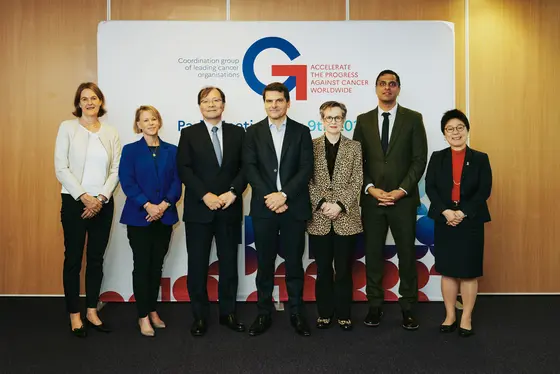According to estimates by the International Agency for Research on Cancer (IARC), in 2020 there were 19.3 million new cancer cases and 10.0 million cancer deaths worldwide and by 2040, the global burden is expected to reach 30.2 million new cancer cases and 16.3 million cancer deaths, partly due to population growth and ageing. The international community is facing complex scientific questions related to cancers and no single country has the capacity to address them efficiently alone.
To cope with this major issue, the G7 Cancer partners believe that a strong international cooperation to coordinate their actions is a catalyst for supplementing and strengthening existing initiatives and accelerating the progress to defeat cancer. Advances in cancer-related genetics and genomics, precision medicine in oncology, diagnostics through new liquid and synthetic biopsy techniques, the emergence of new innovative treatments, and the use of artificial intelligence and digital sciences offer great hope for progress.
Each organization is committed to strengthening strategies and actions to combat cancer, and have demonstrated an alignment in ambition, vision and priorities, providing considerable opportunities to share knowledge and expertise, leverage existing initiatives, develop new initiatives, and propose solutions to improve international cooperation in regards to cancer. To overcome the different types of cancer, it is important to address the gaps in scientific and practical knowledge. International cooperation offers key opportunities to improve knowledge of cancer mechanisms, accelerate the transfer of scientific discoveries and their clinical application, and stimulate innovation on an international scale. G7 Cancer's initiatives will aim to facilitate discussions on these key issues by creating a learning environment, sharing, and developing successful initiatives.
With these joint commitments and actions taken today, and by working all together with partners, G7 Cancer aims at making progress towards beating cancer.
The G7 Cancer priorities
During this first meeting, each organization had the opportunity on sharing priority topics and actions. The priorities for the G7 Cancer for the next years are:
- International Data Strategy, focused on Paediatric cancers as a model.
- Poor prognosis cancers (pancreatic/oesophagus/stomach and liver cancers).
- Cancer outcome inequities.
- Prevention (precancers, screening programs, multi-cancer early detection).
In order to act on these priorities, the following actions have been proposed:
- International conference on data strategy for paediatric cancers.
- International dialogue on pancreatic, liver, esophagus, and stomach cancers.
- Working group on cancer outcome inequities.
- Working group on prevention and precancer.
The G7 Cancer actions are composed of three pillars, each with its own objective:
- The FORUM, to maximise cooperation on best practices and information sharing;
- The FACTORY, to support, develop and implement international cooperation programs;
- The ADVOCACY, to strengthen international engagement by empowering advocacy efforts.
All decisions of G7 Cancer are made based on consensus from all participants.
Finally, the presidency, as well as the secretariat of the group, have been entrusted to the French National Cancer Institute for the next 2 years.



